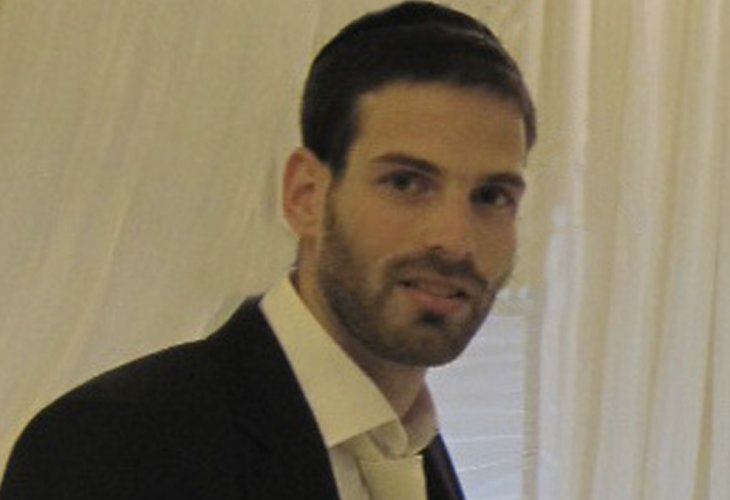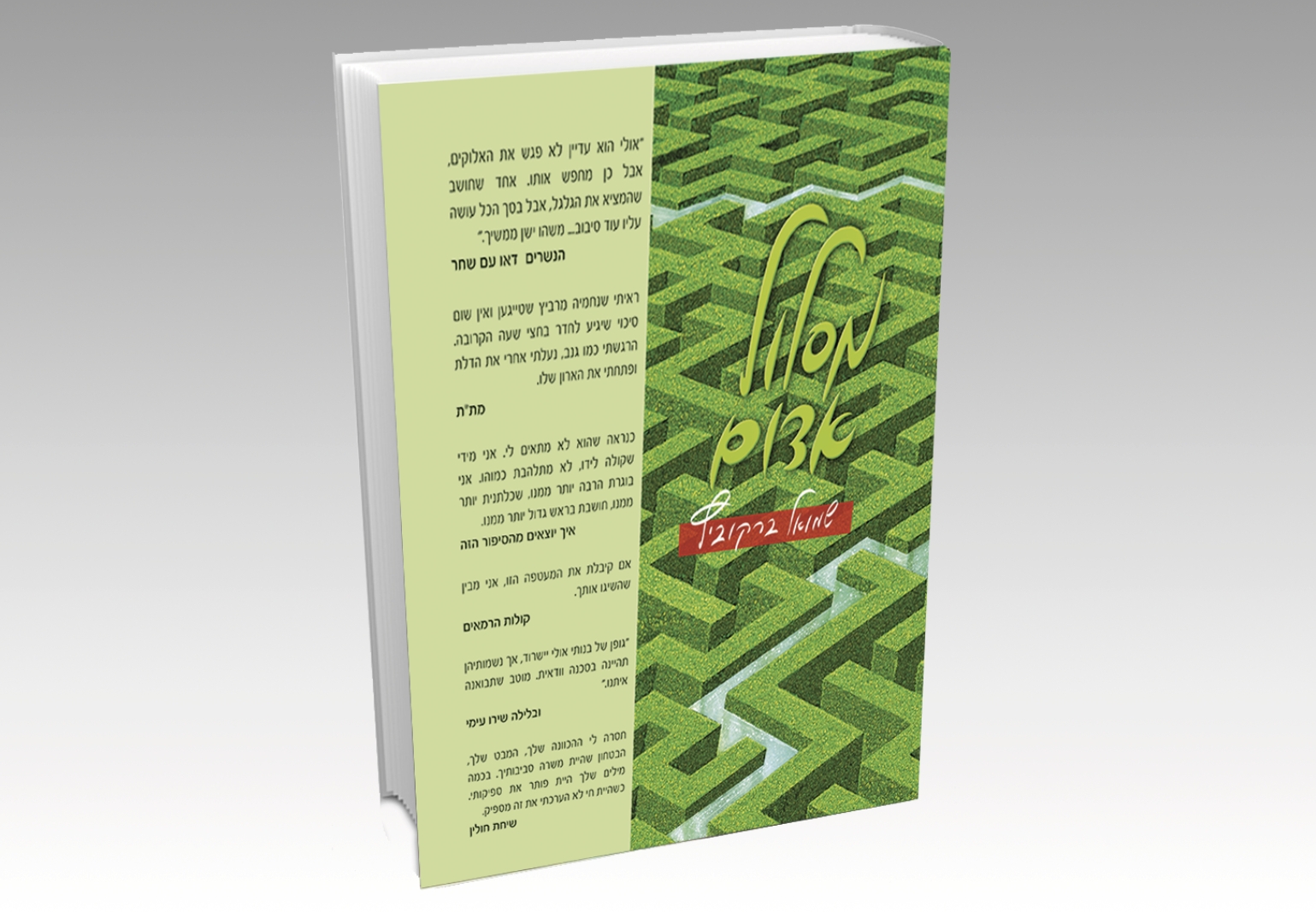Bridging Generations: Rabbi Shmuel Berkowitz on Breaking Taboos
What brings a secular youth back home? Can matchmaking work for older singles? Rabbi Shmuel Berkowitz’s new book targets readers 20+ and touches on unique topics.
 Rabbi Shmuel Berkowitz
Rabbi Shmuel Berkowitz"Who is Rabbi Shmuel Berkowitz, the mind behind the book 'Red Path'? This question has intrigued many readers lately, not just because of the book's unique quality, but also because it's officially aimed at those aged 20-25 and older."
Interestingly, this is not Berkowitz’s first book with an age restriction. His previous book, ‘Grown Children,’ is officially designated for married readers. These are intriguing criteria, rarely seen on books, especially in the Orthodox community.
'Red Path' is a collection of fourteen novellas about the dilemmas and challenges in the Orthodox world. Rabbi Berkowitz isn't afraid to touch on sensitive topics, doing so with utmost care. "The purpose of my stories is to make the thoughtful, intelligent reader consider issues from a new, unconventional perspective," he clarifies, "There are topics considered taboo, but my goal is to bring them up, explore them, and understand them."
Not Here to Preach
The book 'Red Path' opens with 'The Eagles Soared at Dawn,’ written with guidance from Rabbi Mordechai Neugershl. “Even before I began writing, I knew I was delving into a complex issue,” recalls Berkowitz. “I wanted to offer readers the best, and indeed, Rabbi Neugershl was by my side, advising and enhancing the story."
 Book cover
Book coverWhat’s the story about?
"It tells of a family dealing with a son who steps away from Orthodox life, leading a secular life in Tel Aviv. This wandering youth left behind questions, provocations, like bombs in his younger brother's heart, who shared this real-life tale with me. The story addresses various inquiries intellectually and narratively, even tackling questions like why not to be vegetarian, concern for animal welfare, and more. Its surprising, heartwarming ending, brings new hope and encouragement to families."
The book also includes several stories on matchmaking. "I chose to explore it from an internal perspective, one rarely discussed publicly," he notes. "I tried identifying what holds young people back from marrying. For instance, addressing why some conceal medical information in matches and who loses out from this? I did this by using a ‘mild’ medical case to elevate the discussion and its ramifications."
Berkowitz surprises when he reveals that he chose to write one story in a 'literary duet' with the artist R. Yoni Gerstein. "Not everyone knows, but besides his amazing artistic talent, Yoni has a rare writing gift. Although writing with someone whose tools surpass words was challenging, it was worth it. Yoni was unafraid to delete sentences or add his parts to the story. Watching his words colorfully come alive like his illustrations was astounding."
The stories on matchmaking address issues previously undersurface in the Orthodox community. Berkowitz brought up topics like dismissing matches over non-essential matters or fears of 'night of regrets' between engagement and marriage."
Isn't it complicated to tackle such a topic...
"It is, and since I wanted to provide answers suitable for everyone, Hashem placed the idea in my heart to write a branching story – its first part raises doubts and hesitations about why the bride fears marrying her betrothed happily, with responses following each stage. The story splits into two: the first part gives intellectual answers, and the second offers emotional paths. While the first happens over forty-five minutes, the second spans a month and a half. Eventually, all questions find solutions in two different ways, leading to the same final station. This story, with Hashem’s help, received much warm feedback, proving the public’s willingness to adopt and joyfully accept new thoughts."
Since the writing is for adults, Berkowitz tries to leave plenty to ponder. "I won't conclude a story illogically or cover up reality. Even though it's fiction, and I have the freedom to shape it, I won't betray the purpose or hesitate to delete whole sections. In my view, deletion is an art in its own right."
What's the message you try to convey through the stories?
"Who says there’s a message?" he wonders, "I see the story as a means to guide and rethink, but definitely not to educate or preach. Even in the Talmudic era, one of the Amoraim said in Tractate Arachin, ‘In our generation, no one knows how to reprove.' Personally, I can’t read preachy passages and certainly won’t do it to my readers. That’s precisely why I state the books are intended for adults on the back."
A True Democratic Celebration
An exceptional final point in the book is its unique concept: at the end of each story, Rabbi Berkowitz invited other authors to write short columns sharing their personal views and literary critiques. "It’s a truly innovative venture," he admits, "I don’t know of anyone who dared to do this before me. Although it’s common to ask other authors to write flattering reviews, I’m unaware of anyone who sought the opposite in public. I did it intentionally, feeling that since the book features many controversial topics, it’s appropriate to invite other authors who weren’t involved in writing the stories to share their opinions."
 (Illustrative photo: Flash 90)
(Illustrative photo: Flash 90)“I gave them a platform to express whatever they want; things I didn’t touch in the story; what was missing for them; what it stirred in their mind... anything but praise and approval. The stories sent post-writing aimed for no changes after reviews. Sometimes I sent stories to their antithesis: a newspaper system story to an editor; a first story to the magazine editor who used it; a first-person story to someone who doesn’t favor this style..."
Readers can see the result in the book itself, with a line of genuine and professional reviews that aren’t always complimenting. "I think it’s beneficial because it allows readers to rethink what they’ve read," Berkowitz explains. "Recently, I had a talk with a friend who actually sided with a colleague’s opinion on a particular story. I asked him, 'Why are you hesitant to tell me this? I happily included this contrary opinion in my book; it’s a true democratic celebration."

